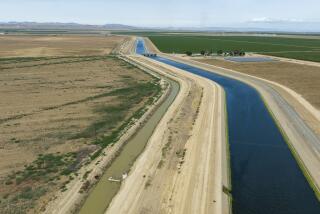San Joaquin Farmers Protest Planned Water Cutbacks
- Share via
FRESNO — The federal government came to the richest farm county in the nation Wednesday and got an earful from farmers, fieldworkers and tractor salesmen about the delta smelt and the economic ruin they say could befall this heartland if the fish gets water once set aside for crops.
How the U.S. Environmental Protection Agency decides to reapportion the water from the Sacramento-San Joaquin Delta--a key link in the state’s supply as well as a vital nursery for fish and wildlife--is one of the most important economic and environmental issues facing California.
Minutes before Wednesday’s hearing on the proposed new allocations, hundreds of farmers and fruit pickers paraded down the streets of Fresno, shouting “No water, no food!” and “Without water, we will perish!” A caravan of tractors and trucks loaded with oranges rumbled from City Hall to the hearing room at a hotel.
Once inside, they wasted no time telling representatives from the EPA and U.S. Department of Fish and Wildlife about the plan to deed at least 800,000 acre-feet of water from farms for the smelt and other threatened fish and wildlife species.
Keith Nilmeier, a fourth generation grape and fruit grower, strode up to the podium wearing a cowboy hat and suspenders and an angry stare.
“I take my hat off to you today not out of respect for what you’re doing but so you can see my face and remember it,” Nilmeier said. “ ‘Cause you’re talking about taking away our jobs and our way of life to save some fish.
“Well look at our faces. We’re endangered species too. The family farmer.”
For 15 years, California officials have struggled with how to reconcile saving one of the state’s most valuable natural resources--the huge estuary that reaches from San Francisco almost to Sacramento--with the desire to keep the tap running to cities and farms.
But the state refused to act and the federal government, facing a lawsuit by 16 environmental groups, stepped in last year to propose water quality standards that would alter the equation between farms, cities and wildlife. The goal is to reduce the estuary’s high salt levels by leaving more fresh water in the delta certain times of the year to hold back saltwater intrusion from San Francisco Bay.
In normal snowpack years, the 800,000 acre-feet held back from San Joaquin Valley farms might not be a problem, farmers say. But in drought years, farmers say they would have no guarantee of enough water to stay in business.
“You people don’t understand the effect of what you’re proposing,” said David Daniel, a produce packer from Mendota, an impoverished valley town where officials predict massive layoffs if the plan goes into effect as written.
“How can you retrain a 45-year-old farm worker like myself. What kind of money will it take to teach people like me another way of life?”
Environmentalists point out that there are two kinds of farming in this valley--the sustainable crops grown along California 99 and eastward and the subsidized cotton and alfalfa grown on weak, salty land on the westside. The farms most affected by the proposed changes, they say, are the less viable westside operations.
But eastside farmers say they too use federal water from the delta and would have to fallow good land if the proposed allocations go into effect. Farmers on the westside dispute the EPA’s estimated economic loss to the area of $20 million.
“When you take 400,000 acres of farmland out of production, which these proposals will do, you’re talking about an economic loss of $400 million,” said Lawrence Turnquist, president of the board of directors of the Westlands Water District.
More to Read
Sign up for Essential California
The most important California stories and recommendations in your inbox every morning.
You may occasionally receive promotional content from the Los Angeles Times.










